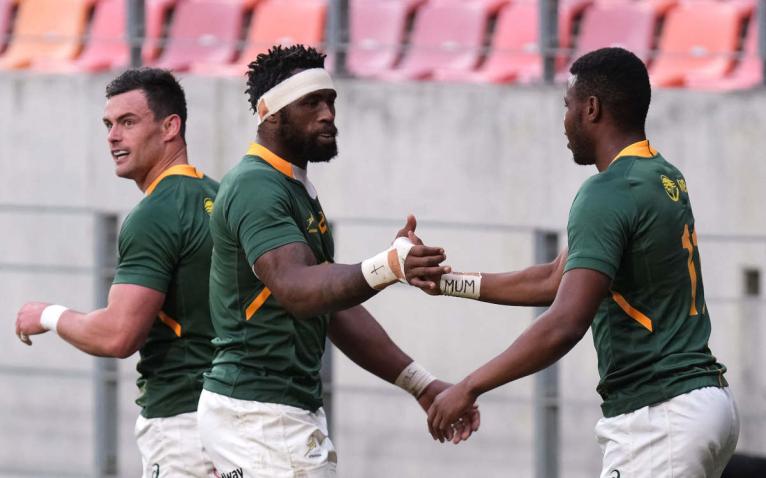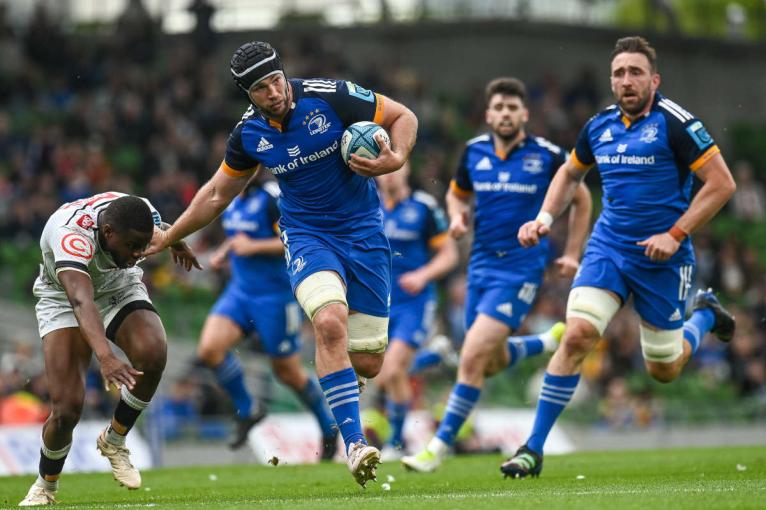A lone vowel separates the surnames of Aphelele Fassi – the 25-year-old Sharks and Springboks outside back – and Brenda Fassie – the singer and activist whose work served as a drumbeat in the anti-apartheid struggle. They are however connected in multiple ways.
For starters, Fassi’s nickname, bequeathed to him by the late commentator Kaunda Ntunja, is ‘Weekend Special’, the title of one of Fassie’s most popular hits. In it she chastises a lover for ignoring her during the week, only to seek a connection on Friday night.
“I love the nickname,” Fassi says. “A lot of people don’t see the work I put in on the training pitch. I think at times there’s been a perception that I don’t put in the hours. Or that I’m not focused and only turn up on match-day. It’s not true. But what is true is that I take pride that I do turn up on the weekend. I take it as a compliment.”

Beyond the four lines on the pitch, Fassi is seeking further connection with the great music icon. He wants to leave a lasting social impact. He expresses his desire to work with charities and perhaps one day establish his own foundation. Now represented by Roc Nation Sports International, the agency owned by the American rapper Jay-Z that also has Siya Kolisi, Cheslin Kolbe, Maro Itoje and Ardie Savea among other international superstars on their books, he recognises the importance of using his platform to better lives beyond his sport. Only, he’s unsure how to do it.
“I’d love to work with an organisation that helps disadvantaged people,” he explains in fairly broad terms. “Rugby is a sport that has shown it can inspire people around the world. Being able to grow your brand in that way is something that I’ve seriously considered and I’d like to make a difference.
“Even though my journey in rugby was clean in that respect, as in I didn’t struggle in my early life and my parents could afford to send me to a good school, I know there are others in South Africa who are judged by where they come from or the colour of their skin. If I could help in some way that would be rewarding. But I know that I’ve got a better chance of making a difference if I start putting in consistent performances on the pitch.”
I’ve had to have some honest conversations with myself which haven’t been easy. No player likes to say that they have a weakness but being able to see that, and telling yourself that you want to work on it, is a good thing
That last point is a pertinent one. Athletes who transcend their sport have almost always done so from a platform of success. Muhammad Ali was heavyweight champion of the world when he refused to fight in America’s conflict in Vietnam, instantly becoming a totem of the anti-war movement. The anti-racist protest of Tommie Smith and John Carlos was amplified because it came from the podium of the 1968 Olympic Games in Mexico City. Siya Kolisi’s story carries that much further as a consequence of his double triumph at the World Cup. As South Africa’s coach Rassie Erasmus famously said, it’s important to keep the main thing the main thing. Inspiration is a by-product of winning.
On that front Fassi has work to do. Three Test appearances and two tries for the Springboks is beyond the ambition of most South Africans in their early 20s, let alone a player in the competitive positions where Fassi operates. Willie le Roux has effectively held the 15 jersey for close to a decade and Damian Willemse looks set to inherit it for another cycle at least. In that time there’s been no shortage of electric wingers and with Canan Moodie on the rise, Fassi’s return to the international fold is littered with obstacles.

He concedes, though, that he is also responsible for being frozen out of the Springboks set-up. After securing a professional contract straight out of high school, where he was scouted by the Sharks while playing in a provincial school tournament, many pundits anticipated a meteoric rise. But a glaring weakness in his game has curtailed his development.
“If I’m being honest with myself, my defence hasn’t been up to the standard that I’d have liked,” he admits. “I’ve had to have some honest conversations with myself which haven’t been easy. No player likes to say that they have a weakness but being able to see that, and telling yourself that you want to work on it, is a good thing.”
In October 2022, three months after his last appearance for his country, Fassi missed a routine tackle on Leinster’s Garry Ringrose which allowed the Irish international to score in a 54-34 win over the Sharks. That was a sixth mistake on defence from 12 tackle attempts, which pointed to a regression following his tackle success rate of just 66% from the previous season.
At full-back you have to sort of be a commentator out there. You’ve got the whole game in front of you and you’re able to see things others can’t see, so you have to be talking all the time. It’s a skill.
A narrative that began as a hunch calcified into an accepted truth. Fassi wasn’t the first hot-stepping back to be branded as a weak tackler and he quickly recognised that some reputations were hard to shake. Raymond Rhule, who has won two consecutive Champions Cups with La Rochelle since being frozen out by the Springboks, faced similar criticisms when he missed nine tackles against the All Blacks in 2017 as South Africa were drubbed 57-0 in Auckland. That was Rhule’s last match in the green and gold.
“I’ve been working incredibly hard with [Sharks defence coach] Joey Mongalo and I’ve put a big emphasis on it,” Fassi says defiantly. “Every day I’m working on something small. There are a few skills I’m working on and I haven’t shied away from my need to improve. I’ve worked consistently on putting myself in positions where I need to make a tackle and I now look forward to contributing in that way.”
Fassi’s switch to 15 has also given him more confidence in his role. He explains how he’s working on the softer skills that come with playing full-back, such as communicating instructions to his team-mates and directing play even when not directly involved.
“You have to sort of be a commentator out there,” he says. “You’ve got the whole game in front of you and you’re able to see things others can’t see, so you have to be talking all the time. It’s a skill. But it comes with experience and having the trust of your team-mates.
“This season, when we were playing the Dragons [which ended in a 69-14 win in Durban], my voice as much as anything else led to me scoring a try. We were on a wide breakdown and had our forwards up. I was the last guy to stand up and I saw some Dragons players over-folding and leaving space on the short side. I called for the ball to come back my way. It went left for Phepsi [Buthelezi] who played a short pass off his shoulder for me. I then gave it to [Makazole] Mapimpi who gave it back to me on his inside and I went through to score.”

That play, and the match more generally, was a perfect illustration of the potential within a club side that has 17 Springboks in its ranks. Except the Sharks have failed to meet their own standards for 13 months now. After finishing fifth in the inaugural United Rugby Championship in 2021-22, they spluttered to eighth last season and could only qualify for the second tier of continental rugby, the Challenge Cup.
Despite the appointment of their former coach, John Plumtree, to try and inject some forgotten quality across the squad, this season has been an unmitigated disaster. With six defeats from seven league games, including a shock 12-10 loss to perennial basement dwellers Zebre, they are second from last in the table.
“We know we haven’t been good enough,” Fassi says. “But we showed last week [against French outfit Pau in a 45-5 home win] that when we’re on, we’re on. We have enough quality to beat any team in the world. We genuinely believe that. We just have to be more consistent and show up.”
A stint in the Challenge Cup presents an ideal opportunity to go deep in a tournament that will attract the attention of Erasmus and his Springboks support staff. Fassi recognises the need to impress at club level. Not only to realise his ambitions of securing a legacy on the field, but off it as well.



No idea why a mediocre club league 4 reserve journeyman gets a mention …. token racist quota selection beneficiary perhaps?